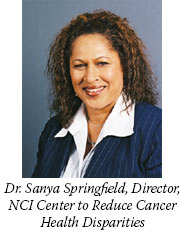
Guest Update by Dr. Sanya Springfield
Addressing Cancer Health Disparities with Science and Hope
 Yesterday marked the national observance of Dr. Martin Luther King, Jr.'s birthday, and with it an opportunity to reflect on his work to raise awareness of inequality and injustice in
our country.
Yesterday marked the national observance of Dr. Martin Luther King, Jr.'s birthday, and with it an opportunity to reflect on his work to raise awareness of inequality and injustice in
our country.
Even now, almost 40 years after his untimely death, the impact of Dr. King's work is still being felt, inspiring research that has given us a better understanding of the disparities that still exist in this country and programs at all levels that can address them. One example is NCI's Center to Reduce Cancer Health Disparities (CRCHD), formed in 2001 with the sole purpose of better understanding and eliminating disparities in cancer through research-based and diversity training programs around the country, and which I have been proud to be part of since 2005.
We are showing tangible signs of progress in cancer disparities research. But as a study that appeared earlier this month in Cancer demonstrated, we are up against significant obstacles. The study found that disparities in cancer treatment did not abate between 1994 and 2002 in the areas of colorectal, prostate, and breast cancers, regardless of socioeconomic status.
The reasons for cancer health disparities can be complex and unique to specific communities. That's why CRCHD is funding a broad range of activities, including the CURE Program, Minority Institution/ Cancer Center Partnership Program, Community Networks Program, and Patient Navigation Research Program. These programs build local partnerships and infrastructure so that the information gathered from these communities is accurate and can better inform the social, behavioral, and educational interventions we are developing and testing to eliminate disparities.
And despite shifts in the national budget, we are developing important new programs, namely the Advanced and Emerging Technologies Initiative, which will dovetail with existing NCI programs to train minority students from high school, college, and postbaccalaureate in fields such as nanotechnology, clinical proteomics, and bioinformatics; and the Geographical Management Program, which will build regional hubs to support cancer health disparities research, training, and infrastructure.
We are also focused on collaboration. Last November, CRCHD co-sponsored a cancer health disparities conference with the American Association for Cancer Research that included presentations on incidence, risk behaviors, and new interventions, as well as the influence of genetics and the environment on disparities.
Studies that are a part of NCI's Cancer Genetic Markers of Susceptibility initiative, in fact, should greatly inform our understanding of the role of genetic variation in cancer disparities. Recent genome-wide association studies have identified specific single nucleotide polymorphisms, or SNPs, that may provide important insights into the more aggressive nature of prostate cancer in African American men. NCI also is working in collaborative studies with other groups to do specific scans in African American populations to identify unique SNPs that may contribute to risk.
In addition, several studies have now suggested that there may be unique genetic factors that influence breast cancer risk in African American women, including a recent study conducted in the United Kingdom that found an increased risk of "triple-negative" breast cancer in African American women.
Along those same lines, relying on data from several large studies, NCI recently published a revised breast cancer risk assessment model that provides better estimates of the number of breast cancers that would develop in African American women 50 to 79 years of age. The model is now available on the NCI Web site for clinicians to use in advising their female African American patients.
So, clearly, our understanding of disparities has vastly improved and we are developing and testing important new interventions. I invite you to visit the CRCHD Web site, where you can read more about recent disparity-related research, get updates on research conferences, and learn how to register for our Cancer Health Disparities Summit 2008.
Our passionate hope is that all people will have access to education in health care and science, access to jobs in our academic research departments, and access to the latest scientific advances used to fight cancer in the communities where they live. We will continue to pursue NCI's mission of sharing progress against cancer equally. Because, as Dr. King once said, "We must accept finite disappointment, but we must never lose infinite hope."
|